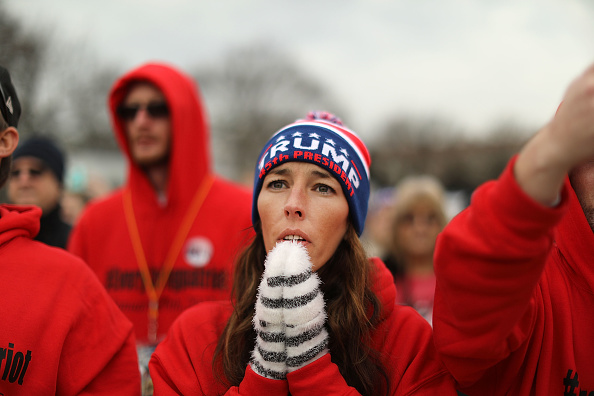
Christianity has been a part of the presidential inauguration since George Washington laid his hand on a Bible for the very first swearing-in. Incoming presidents have invited pastors to give invocations, quoted the Old and New Testaments liberally and gone to prayer services before and after the ceremony.
So it was not unusual that Donald Trump sought to involve faith in his inauguration.
But the ways in which the 45th President invoked God in his inaugural address were unusually blunt. Trump promised to “unite the civilized world against Radical Islamic Terrorism, which we will eradicate completely from the face of the Earth,” and said that unity will be “total allegiance to the United States of America.” He then quoted a Psalm of David from the Bible to buttress his policy. “The Bible tells us, ‘how good and pleasant it is when God’s people live together in unity.’”
He then invoked God’s divine protection over the United States, a common theological concept sure to resonate among evangelicals. “There should be no fear … most importantly, we are protected by God,” he said. And he said that children are “infused with the breath of life by the same almighty creator.”
The swearing-in ceremony did more than reference God, however. It named Jesus Christ specifically, and often.
This public celebration of Jesus was a reason many evangelicals voted for Trump. White evangelicals were core to Trump’s constituency—81% of them voted for him in November. Trump’s campaign also elevated Pentecostals and television preachers, who played a central role in his evangelical advisory committee. Some have been criticized for preaching a gospel of prosperity, a theological belief that God wants followers to thrive in wealth and health.
Paula White-Cain, Trump’s longtime spiritual advisor and leader of New Destiny Christian Center, was the first female clergy to lead an inaugural prayer, according to the inaugural committee. “Let your favor be upon this one nation under God,” she prayed. “Let these United States of America be that beacon of hope to all people and nations under your dominion, a true hope for humankind.” Catholic Cardinal Timothy Dolan of New York prayed from Solomon’s prayer for wisdom: “She knows and understands all things, and will guide us prudently in our affairs.” Sam Rodriguez, president of the National Hispanic Christian Leadership Conference, read aloud Jesus’ words from the Sermon on the Mount: “God blesses those who are poor and realize their need for him, for the kingdom of heaven is theirs.”
Franklin Graham, who leads the Billy Graham Evangelistic Association and rallied evangelicals to polls in every state, told Trump that rain in the Bible was a sign of God’s blessing. “For there is one God and one mediator between God and mankind, the man Christ Jesus,” he prayed from Paul’s letter to Timothy. Two-time Academy Award winner Rabbi Marvin Hier and Wayne T. Jackson, bishop of Great Faith Ministries International in Michigan, also participated.
Rodriguez, White-Cain, Franklin, and Jackson all concluded their prayers “in Jesus’ name.” Dolan and Hier concluded with a simple “Amen.” Nearly all inaugural prayer speakers since George H.W. Bush have been Protestant, but the language of the prayers Trump’s ceremony was largely evangelical. Inaugurals from Dwight Eisenhower through Richard Nixon each included prayers from Catholic, Protestant, Greek Orthodox and Jewish leaders.
Evangelical influence will continue on Saturday at the interfaith prayer service Washington National Cathedral. Ronnie Floyd, past president of the Southern Baptist Convention, will read Psalm 23, which says that the “Lord is my shepherd.”
“Obviously God is sovereign and God has raised him up for such a time as this, and we need to embrace what God is doing,” Floyd says of Trump. “It’s time we all get on board, and say, regardless of the color of my skin, regardless of my economic background, regardless of my religious beliefs, if we are going to see America be all we can be, if I want the job I want, if I want the kind of community I want, if I want the kind of society I want, that is going to happen when we do things together, not when we do things apart.”
David Jeremiah, founder of Turning Point Radio and Television Ministries, will read a passage from St. Paul’s letter to the Romans, about salvation. “I wish we could have had this renaissance among evangelicals not four months ago, but four years ago,” he says. “Evangelicals had a huge part in what just happened.”
Greg Laurie, president of Harvest Christian Fellowship in California, will pray for those serving in the armed forces, the diplomatic corps, governors, mayors and school boards. “This is about praying for those who are in authority whether we voted for them or not,” he says. “[Trump] has taken a stand on a few issues that are very important to us as evangelicals.”
Unlike at the swearing-in ceremony or the earlier private church service at St. John’s Episcopal, the Saturday morning service will include a wide range of religious voices, including Sikhs and Muslims.
More Must-Reads From TIME
- The 100 Most Influential People of 2024
- The Revolution of Yulia Navalnaya
- 6 Compliments That Land Every Time
- What's the Deal With the Bitcoin Halving?
- If You're Dating Right Now , You're Brave: Column
- The AI That Could Heal a Divided Internet
- Fallout Is a Brilliant Model for the Future of Video Game Adaptations
- Want Weekly Recs on What to Watch, Read, and More? Sign Up for Worth Your Time
Contact us at letters@time.com